 |
|
|
|
|
|
|
|
 |
 |
 |
 |
|
|
 |
 |
 |
|
|
 |
His novel " The Plot Against America " is one of the greatest of all-time IMHO.
RIP Boichik
|
|
|
|
|
|
|
|
|
|
|
|
|
 |
Where the hell is DiMucci?
|
|
|
|
|
|
|
|
|
 |
'Bout time, Bobby!

|
|
|
|
|
 |
 |
 |
Posted: |
May 25, 2018 - 5:17 PM
|
|
|
|
By: |
Bob DiMucci
(Member)
|
Roth's Goodbye, Columbus (1959) was actually a collection of fiction comprising the title novella "Goodbye, Columbus"—which first appeared in "The Paris Review"—and five short stories. The book was a critical success for Roth and won the 1960 U.S. National Book Award for Fiction. One of the stories, "Eli, the Fanatic," was adapted for an episode of the Canadian television anthology series "Quest" in 1964.
In 1969, screenwriter Arnold Schulman adapted the novella for the film GOODBYE, COLUMBUS. In the film, recent Army dischargee and college dropout "Neil Klugman" (Richard Benjamin) has moved into the Bronx apartment of his "Aunt Gladys" (Sylvie Straus) and taken a job in the local library. Having been invited by his cousin "Doris" (Kay Cummings) to spend a day at the country club to which she belongs, Neil is attracted to a vacationing Radcliffe student, "Brenda Patimkin" (Ali McGraw), the daughter of a nouveau riche Jewish businessman (Jack Klugman).
Larry Peerce directed the film. Charles Fox scored the picture, with an assist from the songs of the pop group The Association. The Warner Bros. soundtrack LP was most recently re-issued on CD by Collector's Choice in 2006.
Arnold Schulman received an Academy Award nomination for Best Writing, Screenplay Based on Material from Another Medium. He lost to Waldo Salt for MIDNIGHT COWBOY. Schulman did, however, win the Writer's Guild Award for Best Comedy Adapted from Another Medium.
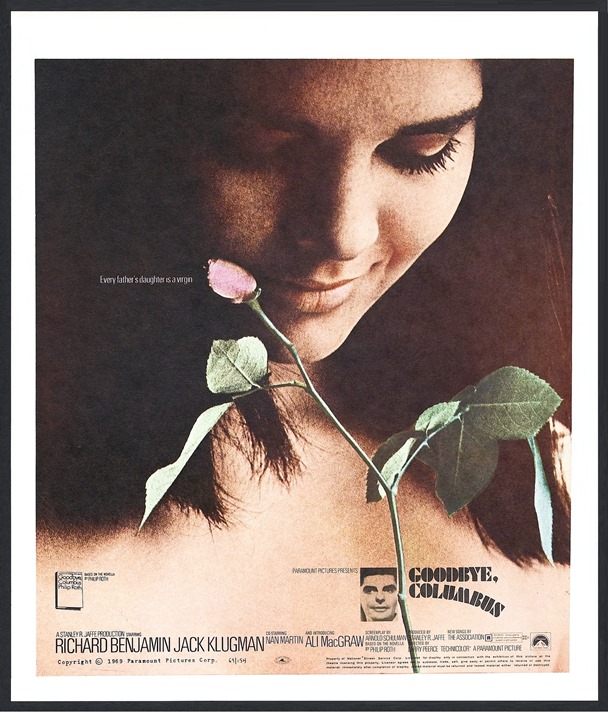
 |
|
|
|
|
|
 |
I read Portnoy's Complaint as a teenager. I don't know how I'd like it now, but I remember laughing aloud at the time.
|
|
|
|
|
 |
 |
 |
Posted: |
May 25, 2018 - 6:46 PM
|
|
|
|
By: |
Bob DiMucci
(Member)
|
Ernest Lehman, a celebrated screenwriter of such films as SWEET SMELL OF SUCCESS (1957) and NORTH BY NORTHWEST (1959), produced, wrote and, for the first time, directed PORTNOY'S COMPLAINT. Philip Roth’s critically acclaimed 1969 novel of the same name, written as a monologue delivered by “Alexander Portnoy” to his analyst, used black humor and what was then considered shockingly scatological language to examine Portnoy’s sexual frustration and guilt caused by his controlling parents, as well as the nature of Jewish life in America. Despite the exaggerated and sometimes stereotypical situations and characters, Roth’s satirical tone was considered by most critics to elevate the book above cliché.
In September 1968, prior to the novel's publication, producer Sidney Beckerman acquired the film rights to the novel for $250,000. Many contemporary critics were skeptical that the idiosyncratic novel could be adapted satisfactorily to the screen. A [Variety news item in December 1969 described concerns over the book’s explicit sexual content, but noted that Lehman was unconcerned, although he had been quoted as calling the script “the trickiest of my career.” Mike Nichols urged Lehman to cast Richard Benjamin, who had acted in Nichols’ 1970 film CATCH-22. Benjamin had previously appeared in 1969's GOODBYE, COLUMBUS, another Roth novel adapted to the screen.
Upon its release, the picture, which contains very little nudity or explicit sex, received an [R] rating, sparking protest from several critics and religious groups. A June 1972 Variety article noted that the Broadcasting and Film Commission of the National Council of Protestant Churches objected to the “explicit and vulgar language” in the film, and suggesting it warranted an [X] rating. In addition, the Division for Film and Broadcasting of the U.S. Catholic Conference, the Protestant Film Bulletin, and the Jewish Film Review condemned the film, and the Chicago police department declared it “adults only” entertainment.
Apart from a few positive reviews, most critics disliked the film and disparaged Lehman, who never directed another film. The New York Times stated that “Lehman… seems to have absolutely no sense of humor,” while the Chicago Sun-Times called the film “a true fiasco.” Charges of anti-Semitism in the film version are reflected in the letters to the editor section of New York Times on 10 September 1972, in which both the national director of the Anti-Defamation League of B’Nai B’Rith and an Illinois rabbi argued that PORTNOY'S COMPLAINT vilified Jews by perpetuating dangerous stereotypes.
Despite the failure of the film adaptation, the reputation of the novel remains intact. In 1998, the Modern Library ranked Portnoy's Complaint 52nd on its list of the 100 best English-language novels of the 20th century. Time included the novel in its "TIME 100 Best English-language Novels from 1923 to 2005."
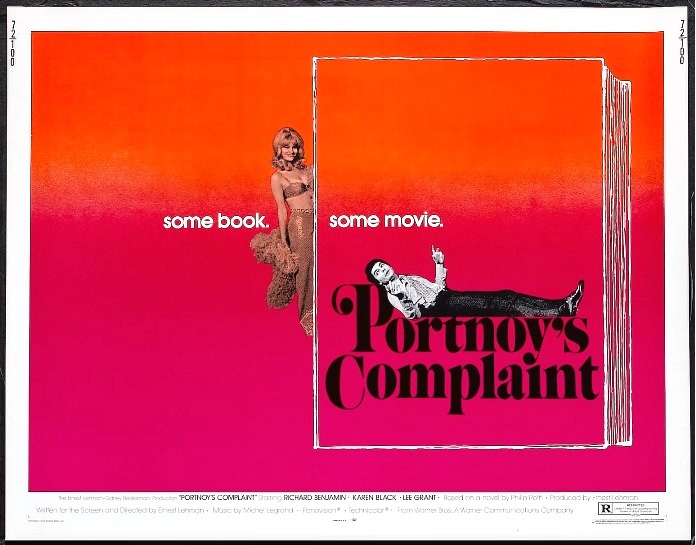
 |
|
|
|
|
|
 |
 |
 |
Posted: |
May 25, 2018 - 7:08 PM
|
|
|
|
By: |
Bob DiMucci
(Member)
|
THE GHOST WRITER was a 1979 novel by Philip Roth. It was the first of Roth's novels narrated by Nathan Zuckerman, one of the author's putative fictional alter egos, and touches on themes common to many Roth works, including identity, the responsibilities of authors to their subjects, and the condition of Jews in America.
The book was widely praised at publication. In The New Yorker, John Updike described Roth as "Always one of the most intelligent and energetic of American writers, he has now become one of the most scrupulous." The Pulitzer committee for fiction selected The Ghost Writer for the prize in 1980. The Pulitzer board, which has final say over awarding the prize, overrode their decision and chose Norman Mailer's The Executioner's Song instead. The book was also a finalist for the 1980 National Book Award.
In 1984, a television adaptation was made of the book in the U.K. It was directed by Tristram Powell and starred Rose Arrick, Claire Bloom, Sam Wanamaker, Cecile Mann, MacIntyre Dixon, Mark Linn-Baker, Ralph Morse, Joseph Wiseman, and Patricia Fellows. The film aired in the U.S. as part of the PBS "American Playhouse" series.
In 1990, Roth married his longtime companion, English actress Claire Bloom. In 1994 they separated, and in 1996 Bloom published a memoir, Leaving a Doll's House, that described the couple's marriage in detail, much of which was unflattering to Roth.
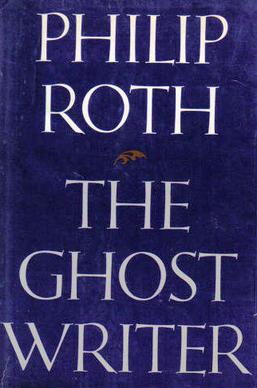
 |
|
|
|
|
|
 |
 |
 |
Posted: |
May 25, 2018 - 7:32 PM
|
|
|
|
By: |
Bob DiMucci
(Member)
|
The Human Stain (2000) is a novel by Philip Roth set in late 1990s rural New England. Its first person narrator is 65-year-old author Nathan Zuckerman, who appeared in several earlier Roth novels, and who also figures in both American Pastoral (1997) and I Married a Communist (1998), two books that form a loose trilogy with The Human Stain.
The novel was well received, became a national bestseller, and won numerous awards. The New York Times choose it for its "Editors' Choice" list of 2000. In April 2013, GQ listed The Human Stain as one of the best books of the 21st century.
In 2003, THE HUMAN STAIN was turned into a American-German-French film drama directed by Robert Benton. Its screenplay was by Nicholas Meyer. In the film, writer "Nathan Zuckerman" (Gary Sinise) has settled in a lakeside New England cabin following his second divorce and a battle with prostate cancer. His quiet life is interrupted by "Coleman Silk" (Anthony Hopkins), a former dean and professor of classics at local Athena College, who was forced to resign after being accused of making a racist remark in class. Coleman's wife died suddenly following the scandal, and he wants to avenge his loss of career and companion by writing a book about the events with Nathan's assistance. The project is placed on the back burner when Coleman has an affair with "Faunia Farley" (Nicole Kidman), a considerably younger, semi-literate woman who supports herself by working menial jobs, including at the college.
In his review of the film in the New York Times], A.O. Scott called it "an honorable B+ term paper of a movie: sober, scrupulous and earnestly respectful of its literary source . . . The filmmakers explicate Mr. Roth's themes with admirable clarity and care and observe his characters with delicate fondness, but they cannot hope to approximate the brilliance and rapacity of his voice, which holds all the novel's disparate elements together. Without the active intervention of Mr. Roth's intelligence . . . the story fails to cohere . . . At its best - which also tends to be at its quietest - THE HUMAN STAIN allows you both to care about its characters and to think about the larger issues that their lives represent. Its deepest flaw is an inability to link those moments of empathy and insight into a continuous drama, to suggest that the characters' lives keep going when they are not on screen."
The film grossed $5.4 million in the US and $19.5 million in foreign markets for a total worldwide box office of $24.9 million against a budget of $30 million.
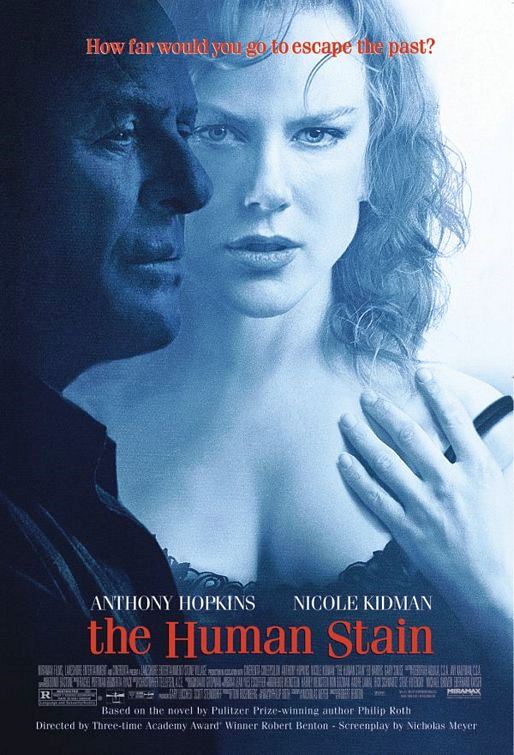
 |
|
|
|
|
|
 |
 |
 |
Posted: |
May 25, 2018 - 8:02 PM
|
|
|
|
By: |
Bob DiMucci
(Member)
|
The Dying Animal (2001) is a short novel by Philip Roth that tells the story of senior literature professor David Kepesh, renowned for his literature-themed radio show. Kepesh is finally destroyed by his inability to comprehend emotional commitment. The Dying Animal is the third book in a series portraying the life of the fictional professor, preceded by The Breast (1972) and The Professor of Desire (1977).
Roth's book was turned into the 2008 film ELEGY, directed by Isabel Coixet. Its screenplay was adapted by Nicholas Meyer. The film stars Penélope Cruz, Ben Kingsley, and Dennis Hopper, and features Patricia Clarkson and Peter Sarsgaard in supporting roles. The film was set in New York City but was shot in Vancouver.
In the film, "David Kepesh" (Ben Kingsley) is a cultural critic and professor, in a state of 'emancipated manhood': His relationships with women are usually casual, brief and sexual in nature. Previously married, he has a son (Peter Sarsgaard) who has never forgiven him for leaving his mother. His friend, Pulitzer Prize-winning poet "George O'Hearn" (Dennis Hopper), suggests that he "bifurcate" his life: have conversations and enjoy art with a wife, and "keep the sex just for sex". David is also in a casual 20-year relationship with "Carolyn" (Patricia Clarkson), another former student. He encounters "Consuela Castillo" (Penélope Cruz), a beautiful and confident student who attends one of his lectures. She captures his attention like no other woman, and they begin a serious relationship.
ELEGY received generally favorable reviews from the majority of critics. The film appeared on several critics' top ten lists of the best films of 2008.
3rd - Kimberly Jones, The Austin Chronicle
4th - Mike Russell, The Oregonian
5th - Marjorie Baumgarten, The Austin Chronicle
6th - Andrea Gronvall, Chicago Reader
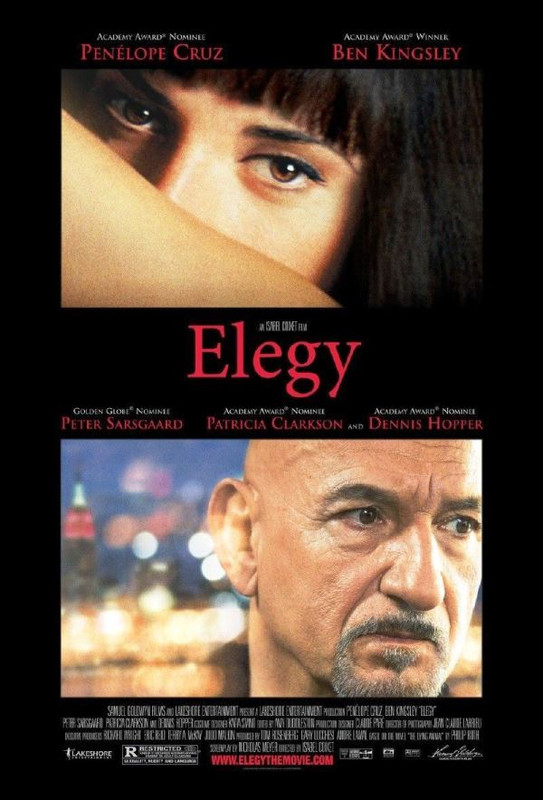
 |
|
|
|
|
|
 |
 |
 |
Posted: |
May 25, 2018 - 9:02 PM
|
|
|
|
By: |
Bob DiMucci
(Member)
|
The Humbling was a novel by Philip Roth published in the fall of 2009. It was Roth's 30th book and concerns an aging stage actor whose empty life is altered by a counterplot of unusual erotic desire. In December 2009, actor Al Pacino purchased the rights to the novel for the purposes of creating a film adaptation.
THE HUMBLING was a 2015 film of the novel, directed by Barry Levinson and written by Buck Henry and Michal Zebede. The film stars Al Pacino, Greta Gerwig, Dianne Wiest, Charles Grodin and Kyra Sedgwick.
In the film, "Simon Axler" (Al Pacino) is an aging actor who suffers from bouts of dementia. He is institutionalized after an incident during a Broadway play, then returns home, where he contemplate suicide with a shotgun he keeps in his attic. When he embarks upon an affair with an ex-girlfriend's amoral bisexual daughter (Greta Gerwig), his world starts to fall apart. It ends on stage, with even Axler's audience and fellow actors unsure what's real and what's not.
Co-producer Barry Levinson decided to make the movie as a dark comedy, noting, "If you want to talk about an older actor in decline, just to do it as some straight drama didn’t seem that intriguing to me," also noting that comedy "seemed to me inherent in the piece". Although both Pacino and Levinson denied that the character of Simon is autobiographical to Pacino's life, Pacino noted that he related to the material, stating that "it’s in, as they say, my wheelhouse."
Although the film in the beginning had ample funding, the budget was cut, by Levinson's estimate, "somewhere in the area of $6 million," when he balked at some of the financiers' demands. Said Levinson, "It came down to this: We could have made the movie for more, but we had to put in certain people, certain actors, to appease all these foreign entities. And we thought, “Geez, it’s so hard to have to put this in for Germany, and so forth and so forth.” It just became so confusing. What can we do to make it at a price where we just make the movie with the people we want? And that’s basically how we did it." It was decided to shoot the film incrementally with several breaks built in to accommodate Pacino's schedule. This was a new experience for Levinson although he welcomed the change of pace as "It added to the clarity."
The $2 million film received only a limited release in the U.S. and got mixed reviews from the critics.
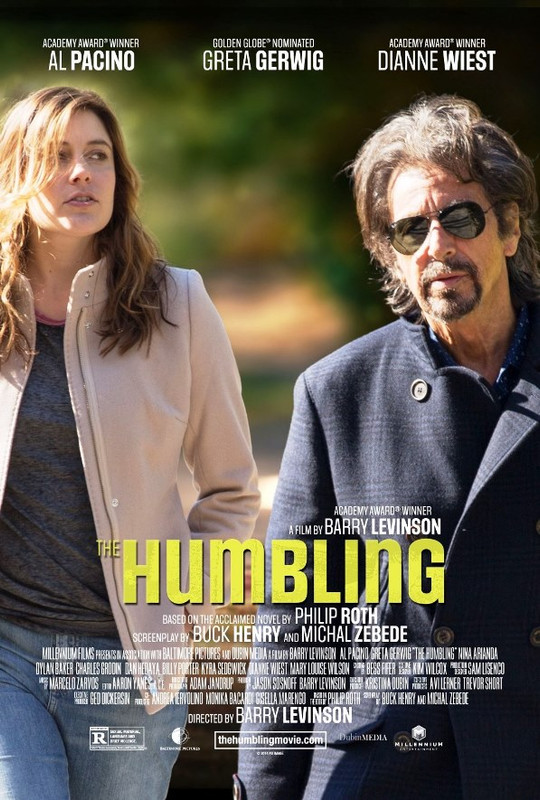
 |
|
|
|
|
|
 |
 |
 |
Posted: |
May 25, 2018 - 9:17 PM
|
|
|
|
By: |
Bob DiMucci
(Member)
|
Indignation was a novel by Philip Roth, released on September 16, 2008. It was his twenty-ninth book. Set in America in 1951, the second year of the Korean War, Indignation is narrated by Marcus Messner, a Jewish college student from Newark, New Jersey, who describes his sophomore year at Winesburg College in Ohio. Marcus transfers to Winesburg from Robert Treat College in Newark to escape his father, a kosher butcher, who appears to have become consumed with fear about the dangers of adult life, the world, and the uncertainty that awaits his son.
Film producer Scott Rudin bought the rights to Indignation in April 2008, five months before the book was scheduled to be published. In September 2008, Lauren Lipton argued on Portfolio.com that Rudin was unwise to acquire the rights to the book "given Roth's Hollywood track record," saying that, "of his many tomes, only a few have made it to the big screen to date."
A film adaptation, INDIGNATION, was eventually made in 2016, without Rudin's involvement. It was co-produced, directed and written by James Schamus (in his directorial debut), and starred Logan Lerman as "Marcus," Sarah Gadon as "Olivia Hutton," a college student from a wealthy family, and Tracy Letts as "Dean Caudwell."
The film received positive reviews. Peter DuBurge of Variety wrote: "Schamus opted to make Philip Roth's 29th novel his own first feature, choosing an emotional and incredibly personal piece of material (it fictionalizes Roth's own early-'50s college experience) that adapts well to his polite, polished and reasonably old-fashioned aesthetic."
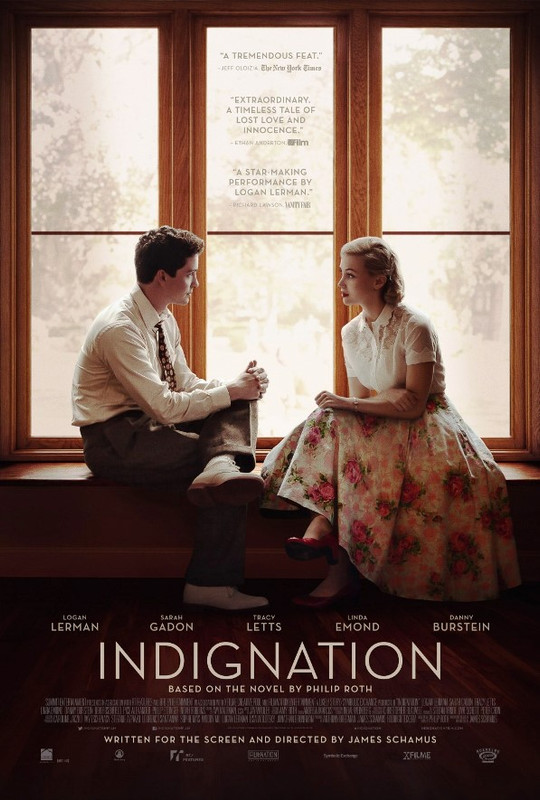
 |
|
|
|
|
|
 |
 |
 |
Posted: |
May 25, 2018 - 10:05 PM
|
|
|
|
By: |
Bob DiMucci
(Member)
|
American Pastoral was a Philip Roth novel published in 1997 concerning Seymour "Swede" Levov, a successful Jewish American businessman and former high school star athlete from Newark, New Jersey. Levov's happy and conventional upper middle class life is ruined by the domestic social and political turmoil of the 1960s during the presidency of Lyndon B. Johnson, which in the novel is described as a manifestation of the "indigenous American berserk". American Pastoral won the Pulitzer Prize in 1998 and was included in TIME's list of the 100 Best Novels.
In 2003, Lakeshore Entertainment started the development of the film, with Phillip Noyce attached to direct. Later, Paramount Pictures acquired the rights, and in May 2012, Fisher Stevens was hired to direct John Romano's adapted script, with Sidney Kimmel Entertainment attached as financier and producer along with Lakeshore. Jennifer Connelly and Paul Bettany were attached for the lead roles, along with Evan Rachel Wood as their characters' daughter.
On June 23, 2014, Ewan McGregor signed on to play the lead role of Seymour "Swede" Levov, replacing Bettany in the role. Connelly was confirmed to be playing "Dawn Dwyer Levov," the former beauty queen and wife of Levov. Dakota Fanning was added to the cast of the film to play the daughter, "Merry Levov," the role once set for Wood.
On February 18, 2015, it was announced that McGregor would also direct the film, making his debut, after Noyce left the project. Valorie Curry joined the cast of the film to play "Rita Cohen", a mysterious young woman from the group of radicals whom Merry has joined in protest against the government in general and the Vietnam War in particular, preceding her committing a bombing.
AMERICAN PASTORAL was released in October 2016. It was neither a critical nor a financial success. It grossed only $544,000 in the U.S. and Canada and $1.2 million overseas. Alexandre Desplat's score was released by Lakeshore Records.
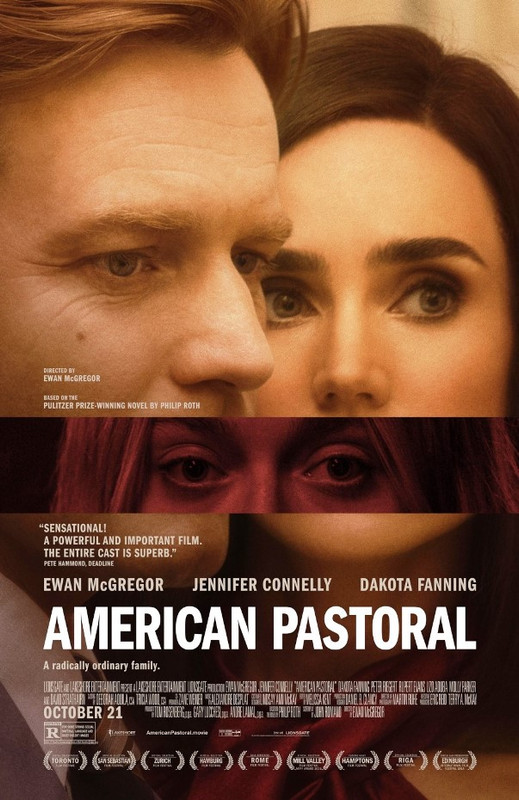
 |
|
|
|
|
|
|
|
|
|
 |
American Pastoral sounds intriguing.
Anyone here seen it or read it?
|
|
|
 |
 |
 |
|
|
 |
 |
 |
| |
|
|
|
 |
|
 |
|
|
|


